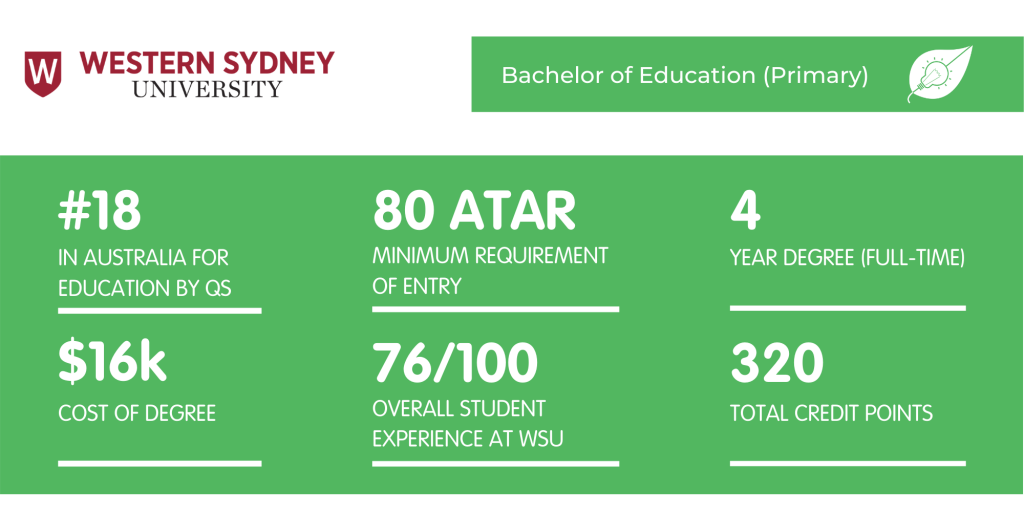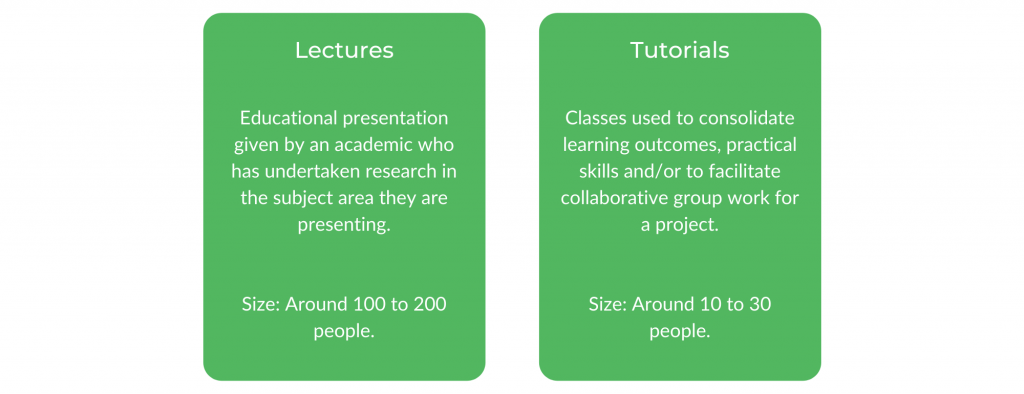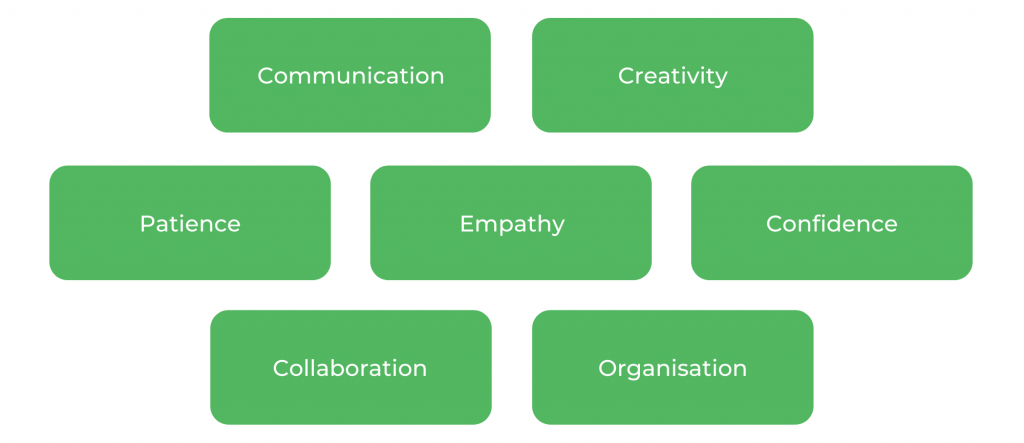Wondering whether you’d like to study a degree in WSU Education?
Well, look no further because you’ve come to the right place. We’ve put together all there is to know about the assessments, culture and what it’s really like to study a Bachelor of Primary Education at WSU.
Let’s get straight into it!
What is a Bachelor of Education (Primary) at WSU?
Core Units for this Degree
How to Get into Primary Education at WSU
What’s the Teaching Format?
What’s the Faculty and Culture Like?
What is a Bachelor of Education (Primary) at WSU?
The Bachelor of Primary Education at WSU is designed to provide students with a direct avenue to professional primary school teaching. So, if you’ve always been keen on educating and supporting younger children, then this is the course for you!
At WSU, you’ll graduate prepared to teach primary school students with a focus on teaching STEM — the Science, Technology, Engineering and Maths subjects — that are becoming more and more in demand.
The Bachelor of Primary Education at WSU is an initial teaching qualification that enables graduates to work in government and non-government schools and other educational fields around the country.
Excitingly, this is actually the first year that the Bachelor of Primary Education is being offered at WSU. So, if you’re looking to begin your journey towards primary school teaching in 2021, then you’ll be the first cohort at WSU ever! If that doesn’t get you interested, then I don’t know what will.
This means that while we’ll be trying our very best to break down the course for you, there will be a few things that we won’t know just yet.
Postgraduate Study
WSU offers particularly competitive and sought after postgraduate programs and WSU’s further study options for Education are no exception.
While there is no honours program for WSU’s education courses, there are plenty of options for Master’s study. A Master’s degree is an optional next step for undergraduate students who are academically excelling, are keen on an additional few years of study and want to gain more extensive experience in a particular subject or field.
Some of the Master’s programs that WSU offers to educational students include:
Continuing your degree with postgraduate studies is definitely not compulsory — you’d be perfectly qualified to begin teaching with your undergraduate degree but it’s always nice to know that the option is there. Especially if you begin your undergraduate studies and realise that you’re particularly passionate about the research side of things.
Career Paths
Since this degree is very career-oriented and practical-based, you’re most likely going to graduate looking for a teaching position. However, there’s a variety of areas that you may take your teaching qualifications into!
These may include but aren’t limited to:
-
- Non-government Primary School Teacher
- Government Primary School Teacher
- School Principal
- Education Field Offer
- Curriculum Designer
- Training and Development Professional
- With some extra studies, you may also look into becoming a school counsellor or mentor
Core Units for this Degree
To graduate from the Bachelor of Primary Education course at WSU, you’ll need to complete a total of 320 credit points.
While it differs across universities, credit points are generally used to measure the workload of particular subjects — for example, at WSU each subject is typically worth 10 credit points. This means that you’ll be taking about 32 subjects in your 4 year course and you’ll complete 4 different classes each semester to be on track to graduate.
Since there is a pretty specific end goal for this degree, the course is generally quite structured. But this can definitely be seen as a good thing.
There are a few elective options as you progress through your degree but for the most part you’ll be following the same program as the rest of your cohort. This means that you’ll be able to score some long-term friends that will stick with you throughout your degree!
It also means that we can take you through some of the classes that you can expect to take right now!
First Year
| First Semester Core Units | Description |
|---|---|
| Sociology for Educators | This introductory unit explores sociological understandings of culture, gender, ethnicity, sexuality and social class. You’ll be learning about the diverse needs of students in a range of different personal and complex circumstances. |
| Literacy and Numeracy for Educators | In this unit, you’ll be developing your own literacy and numeracy skills that are fundamental to participating in academic and professional contexts. You’ll be learning how to communicate your findings and you’ll explore the best ways to transfer this understanding to your students. |
| Scientific Discovery and Invention | This is a foundation unit that will introduce you to the concepts and methods of scientific discovery and how these have impacted society culturally and historically. You’ll learn about how these discoveries are applied to real life. |
Finally, in your first semester you’ll also have the chance to choose an elective to complement your degree. While you can choose from any undergraduate degree that you meet the requirements for, WSU provides a list of recommended electives which include:
-
- Inclusive Education
- Sustainability
- Science
The subjects that you’ll take in your second semester include:
-
- Scientist, Artist, Teacher
- Exploring Patterns and Relationships in Mathematics
- Educational Psychology
- Teachers as Change makers
These are the rest of the subjects that you can expect to study throughout your degree:
| Year of Study | Subjects |
|---|---|
| Second Year | First Semester - Language and Literacy in the Early Years - Numeracy and Mathematics in the Early Years - Being a Teacher - Primary Professional Experience 1: Working in Classrooms Second Semester - History, Geography, Civics and Citizenship in the Primary Years - Engaging with Children, Families, Colleagues and Communities - Pedagogy and Praxis for Aboriginal and Torres Strait Islander Education - Science and Technology in the Primary Years |
| Third Year | First Semester - Numeracy and Mathematics in Years 3-6 - Language and Literacy in Years 3-6 - Engaging Pedagogies - Primary Professional Experience 2: Working with Assessment Data for Instruction Second Semester - Creative Arts in the Primary Years - Health and Physical Education in the Primary Years - STEM Principles and Practices in the Primary Years - Elective |
| Fourth Year | First Semester - Teaching EAL/D Students in the Primary Years - Reading Children’s Literature and Digital Texts - Inclusive Practices in the Primary Years - Primary Professional Experience 3: Engaging with Diverse Students and Communities Second Semester - Researching Professional Practice - Primary Professional Experience 4: Transition into the Profession - Elective - Elective |
If you want to take a more extensive look at the subjects that you’ll be completing, check out WSU’s Handbook!
And there you go! A thorough look at the kinds of subjects you can expect to take as a WSU Primary Education student.
Are there any placements?
There sure are! Since you’ll be working towards becoming a proficient and confident teacher, WSU offers plenty of teaching practice where you’ll get to experience what it’s like to support and guide primary school students throughout their education.
Your Primary Professional Experience subjects are the ones that will allow you to gain real-life experience in classroom settings. Usually these professional experience subjects involve a 15-20 day placement component where you’ll engage and participate in schools and classrooms.
As you finalise your degree, you’ll also participate in a 30 day professional placement under the supervision of a qualified teacher. This unit will be one of your last units and will recognise you as an eligible teacher where you’ll transition from a pre-service teacher to a beginning teacher.
How to Get into Primary Education at WSU
To be eligible for the Bachelor of Primary Education at WSU, you’ll need to get a minimum ATAR of 80.
Alternate Pathways
If you didn’t quite get the required ATAR, there’s no need to stress! WSU offers plenty of alternative options for potential students to get to where they want to be. WSU understands that your HSC mark is not an indication of your strengths and abilities.
You can browse all of the pathway options that WSU offers right here!
The College
The College is WSU’s official pathway provider for domestic and international students. The College is a program designed to provide an alternative pathway for students to get into the Bachelor degree program.
You can complete Diplomas and Bachelor Degrees, Extended Diplomas and University Foundation studies. Once you successfully finish one of The College’s Pathway Programs, you’ll be guaranteed a place at WSU!
If you’re looking for ways into the Bachelor of Primary Education at WSU, there are definitely options for you. You may be interested in the Diploma in Arts Extended – Pathway to Teaching Primary or the Diploma in Arts with a Bachelor of Arts (Pathway to Teaching Primary).
Assumed Knowledge
To qualify for the Bachelor of Primary Education at WSU, you need either an 80 ATAR or 3 Band 5s on an HSC level.
While there are no compulsory subjects that you should have taken in Year 12, WSU does recommend the completion of at least HSC English Standard and HSC Mathematics. If you have graduated with these subjects, you’re good to go!
If you think that your HSC Maths or English skills could use a little more work, you can always look into taking elective subjects that focus on these subjects to hone in on these skills.
Scholarships
WSU also offers a range of scholarships for its potential students. Scholarships are awarded on the basis of academic excellence, community engagement, leadership potential or on account of financial hardship.
You can check out the current scholarships offered by WSU here!
What’s the Teaching Format?
While we don’t know exactly how this degree will be taught, we are pretty confident that you’ll undergo your studies through a 2 semester program — your degree will be split into 2 main study blocks known as semesters. You’ll also be happy to know that there are some pretty generous breaks in between.
If you’re hoping to graduate in 4 years, you’ll be studying as a full-time student and can expect to be taking 4 classes each semester. You can also expect to learn your material through tutorials and lectures.
Class Structure
Lectures
As an Education student, you’ll be attending 4 lectures each week. One for each subject. Typically at WSU, there are about 100 to 200 students in each lecture theatre and it will give you a chance to take notes and learn about the content for the upcoming week.
Lectures generally involve a lecturer standing up the front of the theatre discussing the material in the format of a presentation. These are usually formal classes and you won’t really get a chance to ask questions or discuss the content with your peers — that’s what tutorials are for.
Tutorials
Similar to lectures, you can expect to attend a tutorial for each of your subjects — so, 4 a week. Tutorials will usually have anywhere between 10 to 30 students in a classroom at a time and will take a much more informal and conversational approach.
Tutorials provide students with a chance to go over lecture material, engage in group work and participate in classroom discussions. Tutorials at WSU will usually last from 1 and a half to 2 hours and will often vary as you progress through your degree.
How much time will you spend on campus?
Since you’ll be taking 4 subjects each semester, you’ll be on campus for about 20 hours to account for lectures, tutorials and hopefully some individual library study to consolidate your knowledge. You’ll hardly notice the time going by!
Skills That You Refine and Learn
Your Primary Education degree at WSU is going to fully prepare you for your future career as you make the transition from a studying teacher to a practicing primary teacher. WSU is going to ensure that their students develop the appropriate skills for teaching.
Your communication and patience is going to be essential. You’ll learn how to communicate with younger children through tried and tested methods so that their education is enjoyable and effective.
As a teacher, you’re not only going to be developing these skills for yourself but it’s just as important that you learn to teach these skills as well. You’ll be educating students on the importance of empathy, collaboration, patience and communication just as you’ll be refining these skills for yourself.
What’s the Faculty and Culture Like?
As a student in the Bachelor of Primary Education Course, you fit right into WSU’s School of Education.
Not only will you be surrounded by tutors, staff and mentors that have unlimited experience and knowledge to offer but you’ll also be constantly growing your network so that you’ll always feel prepared to take your next step.
We can safely assume that the Primary education cohort at WSU are a group of caring, empathetic and intelligent people who are always willing to help out or support you. Since you’ll be studying at WSU for 4 years, you can expect to make loads of long-term and reliable friends who you’ll work with and get to know really well throughout your degree.
Societies and Clubs
There are plenty of options when it comes to the student-lead clubs and societies that are offered at WSU. So, you’ll be in safe hands when it comes to finding people with similar interests to you.
WSU has over 130 clubs and societies that are open to all students! Whether you’re interested in an education club, a social club or even a political society, you’ll feel at home at WSU.
You can have a better look at WSU’s clubs and societies here!
Resources
WSU offers a variety of assistance for current and future students and will be always willing to help out. You may be looking for a little support academically, some assistance emotionally, help financially or maybe you’d just like someone to talk with.
WSU is always wanting to help out so you can check out the resources that WSU provides here!
Gemma Billington is a Content Writer at Art of Smart and an undergraduate student at the University of Technology Sydney. While studying Journalism and Social and Political Sciences, Gemma enjoys spending her time at the gym or reading about Britain’s medieval monarchy – ideally not at the same time. She currently creates and administers social media posts for Central News and writes for the student publication, The Comma. After completing her undergraduate degree, she hopes to study a Masters of Medieval History and is very excited about the prospect!





